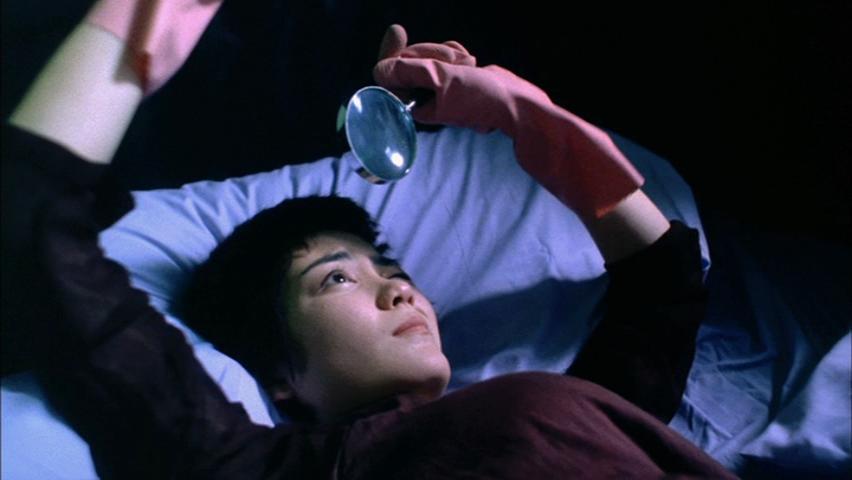Film Analysis: Chungking Express (1994) by Wong Kar-wai
“We’re all unlucky in love sometimes.”
Although the question of which Wong Kar-wai film is the best could last eternally, for this particular writer, there is no doubt that “Chungking Express” stands on a level above the rest, with the recent restorations actually cementing the fact in the most eloquent fashion. Let us check the reasons why.
“Chungking Express” is streaming on MUBI Malaysia

Cop 223 has been rejected by his former girlfriend, May, on April Fool’s Day. Since then, he has been buying one can of pineapple every day with an expiration date of May 1, his birthday, and in an utterly baseless assumption, he believes that if she does not call by the time he has bought 30 cans, their love will expire. In this scenario, he will eat all the cans. Eventually, he meets a woman with a blonde wig who tries to solve her own, much more dangerous issues, and the two of them start sharing their solitude. In another part of the town, Cop 663, who is also separated, meets an eccentric waitress named Faye who is obsessed with the song “California Dreamin” by the Mamas and Papas, and falls in love with him. Initially oblivious to her feelings, and indulging in his own promiscuous relationships, eventually he starts realizing both his and her feelings.
The vast majority of Wong’s characters are lonely entities living in their own world, and their solitude is so vast that it can neither be understood or satisfied. Their other feelings are repressed by this sense of loneliness, to the point that emotional tensions are created, which usually result in the characters not being able to commit or, in some cases, ending up abandoned when they least expect it. In “Chungking Express”, he focuses on four lonely, separated, antisocial and daydreaming characters, who desperately try to share their desolation, with the megalopolis being the link that connects their stories. At the same time, however, the particular setting and the people that inhabit it, despite their density, is where the loneliness of the characters also derives from, as in this chaos, they cannot find the “space” to connect to anyone and end up alone, at least sentimentally. WKW gives a romantic hypostasis to his loneliness, but the fact remains.
DPs Christopher Doyle and Andrew Lau mostly shot the movie with a handheld camera, and the result perfectly fits the crowded and tense urban environment where the story takes place, essentially giving a permanent claustrophobic sense, which mirrors the psychological status of the protagonists perfectly. The two parts, however, are somewhat differently shot. The first is fast-paced and the editing is brisk, with the handheld camera moving rapidly inside the chaos of the city at night. On the other hand, the second story is more slow-paced and has scenes occurring in closed spaces during the day, although the use of the handheld camera remains. Also of note, is one of the most iconic scenes in the director’s filmography, when Cop 663 is drinking coffee and Faye is just watching him. Wong makes his actors move slowly while filming at a speed lower than the regular 24fps, resulting in time-elapsed blurring of various people moving at a faster speed than the actors, either on the foreground or in the background.
The iconic scenes, however, do not stop here. In the first story, the days pass and on April 30, Cop 223 visits a supermarket that no longer carries pineapple cans with the specific date, since the attendant has pulled them out due to their expiration date. He is frustrated, but is met with mockery and contempt by the attendant, who ends up giving him a basket of expired cans. The pineapple represents May for Cop 223 and the expiration date the end of their relationship, thus his despair to find a can even on the last day. Wong presents one of his recurring notions through this scene, which is that change is inevitable and unavoidable, and that nothing endures, as Cop 223 decides that everything has an expiration date. The scene also entails Wong’s subtle sense of humor, as he argues about the value of fresh food and the effort it takes to manufacture a can of pineapple. Furthermore, when he sits outside the shop and offers one of the cans to a passerby, he also mocks him and says to keep the expired can for himself. Furthermore, Takeshi Kaneshiro’s acting finds its apogee in this sequence, with his adorable frustration and sad realization being excellently portrayed.
Furthermore, in the second story, Cop 663 enters the shop where Faye is working and asks for a chef salad. She prepares it while dancing to “California Dreaming” by The Mamas and the Papas. The event occurs at night and Wong Kar-wai presents it through the perspective of Faye, who watches Cop 663 approach. She dances to the song and appears somewhat disinterested. However, the narration has already informed the spectator that she will fall in love with her customer, giving the scene a whole other meaning, as she states that she likes loud music because it prevents her from thinking. The use of the particular song symbolizes the Westernization Hong Kong has experienced through the decades, with the protagonists having grown up with Western cultural influences. It also states its twofold nature, which lingers between the English and the Chinese.
Lastly, in a sequence of scenes edited into one, the camera follows Faye into Cop 663’s house where she proceeds to tidy up and do various chores. She does not stop there, however. She puts sleeping pills in his bottled water to prevent him from going out at night, she checks his wallet, she examines his bed with a magnifying glass for other women’s marks, and she even changes the etiquettes of his sardine cans. A cover of The Cranberries’ “Dreams” with Faye Wong on the vocals is heard throughout the sequence’s duration. The sequence is probably the most romantic in the whole film, exemplifying the unrequited love Faye feels for Cop 663 and the extremes she is willing to reach in order to care for him, learn of him, and also have an ipact in his life in any way, despite the fact that he does not have a clue about her feelings. Faye Wong appears utterly adorable through her mischievousness, in her own highlight in the film.

In general, “Chungking Express” displays a great Asian cast, including Brigitte Lin and Valerie Chow, with the bulk of the actors also highlighting Wong Kar-wai’s “obsession” with every aspect of his movies being beautiful. However, in terms of acting, the one who stands apart is Tony Leung, as 663, despite the fact that he had to play a role that depicts the results of Faye’s actions. The portrayal of a silent and tough man who is interested in a woman but is afraid to express his feelings is impressive in its measured approach, while his chemistry with his co-star, another of the movie’s great traits.
Not much more to say, “Chungking Express” is one of the greatest films of all time, a must-watch for every fan of cinema.






